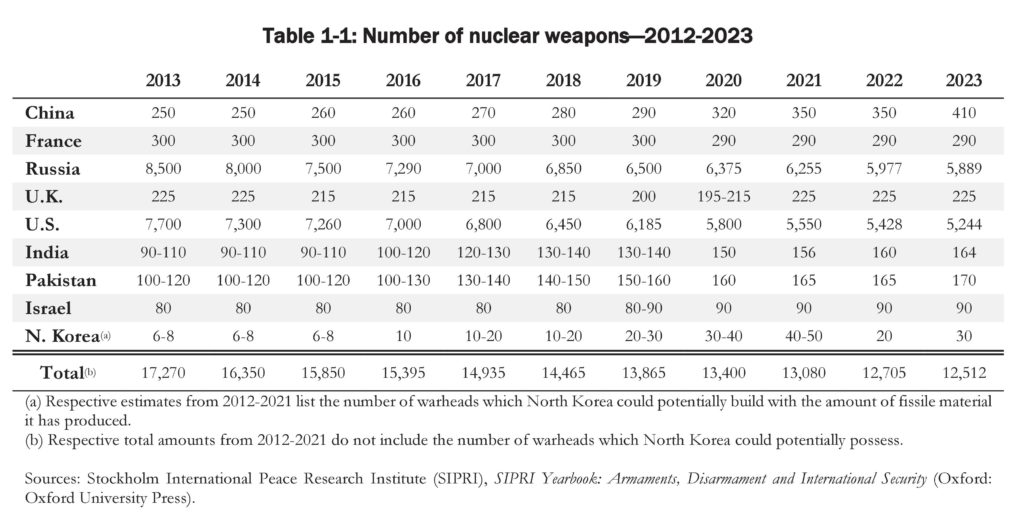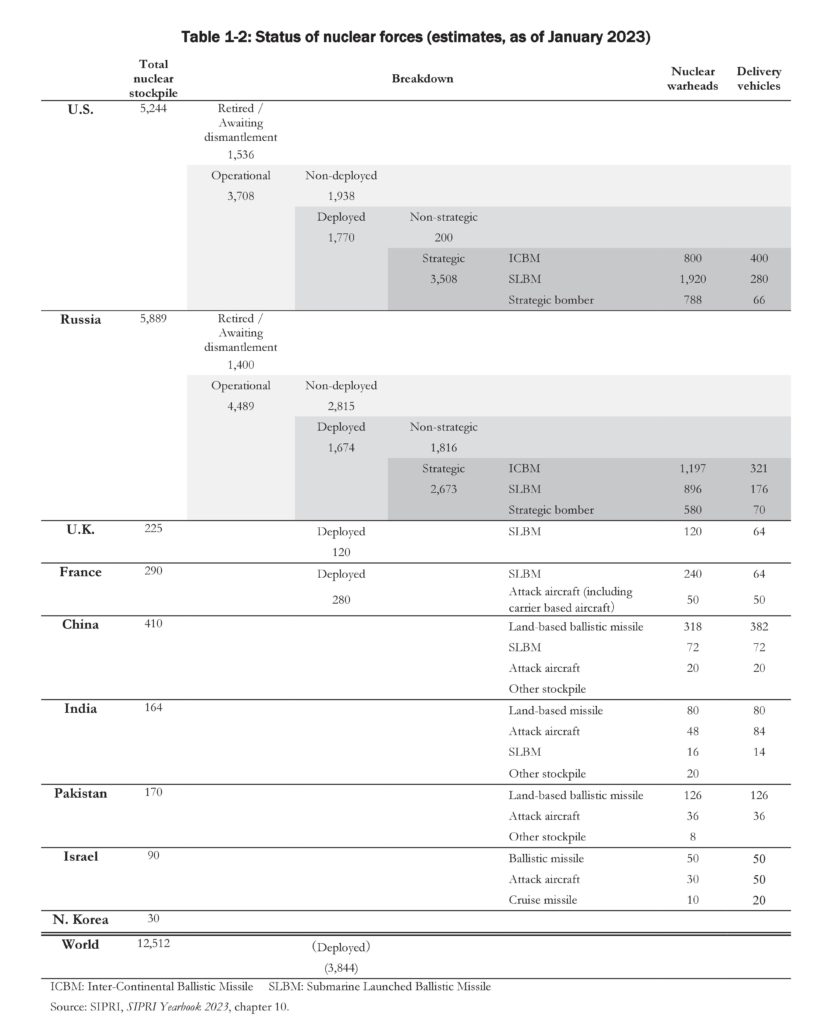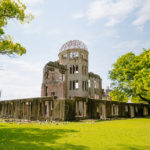Hiroshima Report 2024Chapter 1 Nuclear Disarmament (1)Status of Nuclear Forces (estimates)
As of December 2023, eight countries have declared that they possess nuclear weapons. According to Article IX-3 of the Nuclear Non-Proliferation Treaty (NPT), “a nuclear-weapon State [(NWS)] is one which has manufactured and exploded a nuclear weapon or other nuclear explosive device prior to 1 January 1967.” China, France, Russia, the United Kingdom, and the United States meet this requirement, and have acceded to the NPT as NWS as defined by the treaty. The three other countries that have tested nuclear weapons and declared having them are India, Pakistan and North Korea. India and Pakistan have never been parties to the NPT. Israel, a non-NPT state, has maintained a policy of “nuclear ambiguity” by neither confirming nor denying having nuclear weapons, although it is widely believed to possess them.2 (There is no conclusive evidence that Israel has conducted a nuclear explosive test.) In 2003, North Korea declared its withdrawal from the NPT, and, subsequently, its acquisition of nuclear weapons. In this report, these four additional states that have publicly declared possession of, or are believed to possess nuclear weapons are referred to as “other nuclear-armed states.”

The total number of nuclear weapons in the world, which grew to approximately 70,000 at the peak of the Cold War era, has been reduced significantly since the late 1980s. According to the estimates by the Stockholm International Peace Research Institute (SIPRI), however, 12,512 nuclear weapons (including those of awaiting dismantlement) still exist on the Earth as of January 2023, with the U.S. and Russian nuclear stockpiles together constituting approximately 90% of the total. This amount includes retired warheads; if these are excluded, the number of nuclear warheads in arsenals in the world has increased from 9,440 in the previous year to 9,576. In addition, the number of nuclear warheads deployed with operational forces has also increased from 3,732 in the previous year to 3,844.3 Furthermore, all of the nuclear-armed states have been actively pursuing the modernization of their nuclear forces, and emphasizing the role of nuclear weapons in their security strategies.
Among nuclear-armed states, France and the United Kingdom have disclosed the maximum number of their nuclear stockpiles. In 2015, France declared it possesses not more than 300 nuclear weapons, and reported that “[i]t has no undeployed weapons. All of its weapons are deployed and operational.”4 Meanwhile, the United Kingdom announced in the Integrated Review of Security, Defence, Development and Foreign Policy published in March 2021 that it would increase the overall nuclear warheads stockpile ceiling from no more than 180 to no more than 260.5 Since these statements, neither country has provided additional details about their nuclear weapons stockpiles.
In recent years, China has accelerated the expansion of its nuclear arsenal. According to SIPRI’s estimates in 2023, there has been an increase of 60 warheads compared to the previous year. It is also estimated that India and Pakistan have each added about 10 warheads annually over the past several years. In addition, North Korea has been bolstering its nuclear capability both qualitatively and quantitatively.
1 This chapter is authored by Hirofumi Tosaki.
2 In an interview, Israeli far-right cabinet minister Amichai Eliyahu, Minister of Heritage, said that “that is one way” regarding the possibility of a nuclear attack on the Gaza Strip. In response, Prime Minister Benjamin Netanyahu issued a statement saying, “Eliyahu’s words are detached from reality.” “Netanyahu Rushes for Damage Control, Suspends Minister for Gaza Nuclear Bombing Remark,” Wion, November 5, 2023, https://www.wionews.com/world/netanyahu-rushes-for-damage-control-bans-minister-over-nucle ar-bombing-remark-on-gaza-655362.
3 Stockholm International Peace Research Institute, SIPRI Yearbook 2023: Armaments, Disarmament and International Security (Oxford: Oxford University Press, 2023), chapter 10.
4 NPT/CONF.2015/10, March 12, 2015.
5 United Kingdom, Global Britain in a Competitive Age: The Integrated Review of Security, Defence, Development and Foreign Policy, March 2021, p. 76.







